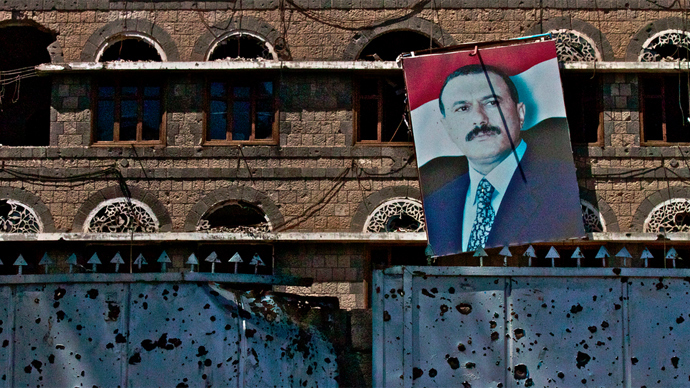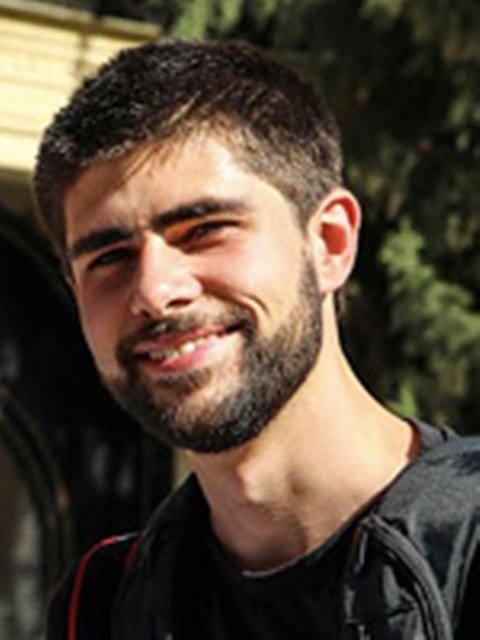Yemen’s got 99 problems, but a drone ain’t one

As Yemen faces a widely popular secessionist movement in the south, an entrenched Shiite rebel movement in the north, and a scattered Al-Qaeda insurgency campaign roused by US drone strikes, the state is effectively being pulled apart at the seams.
The central government in Sana’a is desperately weak and commands little authority outside the capital. Militant groups, rebels, and tribes seized the opportunity to embolden themselves, following the drawn-out resignation of strongman, Ali Abdullah Saleh, in 2011. The ancient capital, one of the world’s oldest continuously inhabited cities, is rife with bullet holes, damaged infrastructure, and rubble from past explosions and fires. As the poorest country in the Arab world, some 54.5 percent of the population lives below the poverty line and economic stagnation is worsening. The severe instability of the state today is a consequence of three decades of rampant mismanagement under Saleh’s rule, as he consolidated his power through a system of patronage that wildly enriched members of the country's tribal, economic, and military elite at the expense of the wider public. Following an assassination attempt that significantly injured him, Saleh handed over power to his deputy, Abdrabbuh Mansour Hadi, who became president in February 2012, after he stood unopposed in elections.
Hadi is regarded as a weak figurehead of the previous regime. Although a change in leadership was achieved in 2011, grassroots demonstrators and activists view the post-uprising landscape as a game of musical chairs among the elite who still cling to power. As a response to the multiple political, economic, and security crises facing Yemen, President Hadi has thrown his weight behind UN-backed reconciliation talks known as the National Dialogue Conference.
Yemen’s dialogue has rather impressively brought together some 565 representatives from all backgrounds – Shiite rebels, secessionists, women’s rights activists, members of civil society, socialists, Islamists, and tribal chiefs – to reform the security apparatus, draft a new constitution, and assess the feasibility of adopting a federal system. The talks began in March 2013 and continue to drag on into their ninth month, after secessionists from the South boycotted the talks citing irreconcilable differences. The vast majority of Yemenis seem to have little faith or interest in the dialogues, which take place in a luxury hotel on the outskirts of the capital. President Hadi claims that a failure to reach a framework agreeable to all sides will result in bloody civil war, an assessment that is as grim as it is accurate.
‘Yes to the South!’
South Yemen existed as an independent country with a seat at the UN from 1967 to 1990, and was run by a Marxist government that voluntarily entered into a union with the North on equal terms; the South controlled more territory, most of the resources, and had a stronger national currency. Although unified in 1990, integration was largely unsuccessful and a civil war broke out in 1994. This led to the North subjugating the South and dissolving its government and institutions.
In the post-Soviet world, it is quite unprecedented for a movement to restore a former satellite state sustained and widely supported by the people. Southerners regard their state as occupied by the government in Sana’a, which they accuse of marginalizing southern regions and plundering oil resources. Ali Salem al-Baid, former president of South Yemen under the Yemeni Socialist Party, leads the widely supported Al-Hirak movement, which largely boycotted Yemen’s national dialogue by rejecting federalism and only agreeing to dialogue on the condition of full southern independence. Although public figures in the South endorse only peaceful means to achieve their goal, separatist militants have launched dozens of attacks on government forces since 2009.

Protests rejecting the national dialogue in the former southern capital of Aden have become commonplace, and many see the government in Sana’a as a disingenuous actor that fails to deliver on promises of development, while dismissing the South’s desire for self-determination. Most representatives from the South who chose to take part in the dialogue suspended their participation due to being excluded from some of the discussions and deal-making processes. The absence of southern representation in the national dialogues essentially makes the talks and their outcome somewhat irrelevant. Southerners boycotted the 2012 presidential elections and openly resent the north; they frequently rally for independence on national holidays and the government in Sana’a is aware that the South would secede if a referendum on independence were ever held. If the North agrees to a federal system, it may placate some moderate factions in the South, but even significant concessions will likely not satisfy those in armed separatist movements who have campaigned against politicians deemed to be collaborators with Sana’a.
State within a state
Shiite militias in Yemen’s northwest control areas stretching from the Saudi Arabian border to just outside the outskirts of Sana’a, and the influence of the Houthi movement has grown considerably since the ouster of President Saleh in 2011. The rebels, who have around 120,000 followers, are based in the remote northern stronghold of Sa’dah and have been successful in attracting disenfranchised youth to their movement, as well as the large Shiite population in Sana’a.
The Houthis can be compared to Lebanon’s Hezbollah movement in that they control large areas and essentially function as a state within a state. Yemen’s government, which is a close ally of Saudi Arabia and the US, accuses the Houthis of being agents of Iran, although Tehran has always denied such claims. Politically, the Houthi movement is explicitly opposed to Saudi Arabia’s puritanical Wahhabi Islam and identifies with the Tehran-Damascus-Hezbollah axis; the rebels have borrowed slogans such as “Death to America” and “the Great Satan” from the Iranian lexicon.

Reuters quoted a spokesperson for the Houthi youth league as saying, "The Houthi movement is a resistance movement. Its political slant is clear: the rejection of the hegemony and global arrogance of the United States… We took part in the revolution (against Saleh) and we have a political vision for a civilian state that ensures rights, freedom and equality for all, regardless of which region or tribe people come from."
Government forces have fought several wars against the Houthi since 2004, and the latter has agreed to take part in the national dialogue, which may result in a federal power-sharing agreement that would give the Houthis autonomous control over the area they currently hold. A government-brokered ceasefire between the Houthis and Al-Qaeda-backed Salafist fighters has recently crumbled, giving rise to increasing sectarian violence in the northern areas that threatens to bleed south into Sana’a.
Houthi rebels and their affiliated tribesmen are not inherently secessionists: principally, they are calling for the freedom to think and worship as they please and government cooperation in mediating tribal and sectarian land disputes; they want Sana’a to acknowledge and legitimize their presence. The Houthis are also allied with the southern secessionists, and if the latter succeeds in breaking away and becoming independent, the Houthis may also follow by expanding their reach in the northern areas, if an agreement cannot be reached with Sana’a.
Thumbs up for drone wars
When I visited Yemen last year, several professionals and
ordinary people conceded to me that the real seat of power in the
country is not the presidential palace, but the American embassy.
Yemen is the second most active hotspot in the US drone program
behind Pakistan, but unlike the leadership in Islamabad,
President Hadi is a staunch supporter of US drones, despite the
high number of civilian casualties incurred by the strikes.
Al-Qaeda's Yemen branch – AQAP – only consists of a few hundred
fighters, but their tactics using sophisticated car bombs and
suicide bombs have been bold and deadly. AQAP is active in the
south-central regions of the country and have brought their fight
against the government in Sana’a and the Houthis, while remaining
more-or-less indifferent to the Southern separatists. The bitter
irony is that Saleh openly supported Al-Qaeda and Yemeni
mujahedeen who fought against the Soviet Union in Afghanistan in
the late 1980s against South Yemen.

Furthermore, it is widely believed that Saleh continued to covertly facilitate Al-Qaeda - which he viewed as a less imminent threat to the problems posed by rebels and separatists - to secure backing from Washington. The central government in Sana’a has been overly dependent on the US, which has carte blanche authority to violate Yemen’s sovereignty. It is unlikely that any Yemeni government could convince Washington to end the drone program, and these factors have led to increasing public animosity against the government in Sana’a, which may boil over at some point.
President Hadi faces an extreme balancing act that may require the government to make painful concessions to its armed opponents to preserve the unity of the state. Given the legitimate grievances of the parties involved, they can hardly be blamed for resisting compromise and acquiescence to the corrupt elite in Sana’a. Presidential elections are planned for early 2014, and some suspect Saleh will use his extensive influence in the military to make a comeback of some kind. Reports claim that Saleh secretly told an Al-Jazeera journalist that he would be back in power before those elections are held. If UN-backed reconciliation talks fail to deliver a workable solution, the state could disintegrate into lawless caliphates and anarchy.
The statements, views and opinions expressed in this column are solely those of the author and do not necessarily represent those of RT.
The statements, views and opinions expressed in this column are solely those of the author and do not necessarily represent those of RT.













